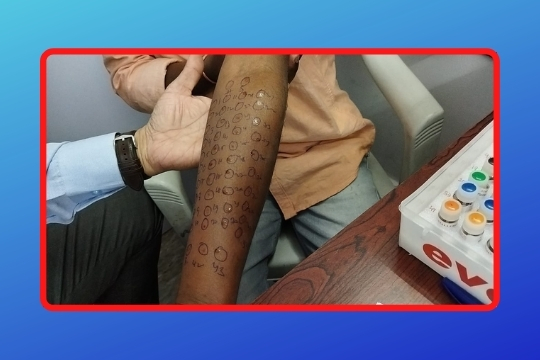Allergy Management & Immunotherapy For Allergies

Allergen immunotherapy is the repeated delivery of allergen extracts to allergic people in order to give long-term symptom alleviation and improved quality of life during natural allergen exposure. In individuals with a limited spectrum (1 or 2) of allergies, allergen immunotherapy is extremely beneficial in IgE-mediated illness. Immunotherapy is used to treat allergic rhinoconjunctivitis and allergy asthma caused by seasonal pollen, as well as chronic illness caused by sensitivity to home dust mite and animal danders.Immunotherapy, unlike anti-allergic medications, has been shown to alter the disease's underlying aetiology, with proven long-term benefits. Immunotherapy and Nasal Mucosal Reduction / Desensitization Surgery Benefits maximum to patient to relieve symptoms and disease cure
What are some of the allergy symptoms and signs?
Mild, moderate, and severe allergy symptoms are classified as follows:
• Local symptoms (affecting a specific area Mild responses include things like a rash or hives, itching, watery/red eyes, hay fever, and a runny nose
.
• Moderate reactions include symptoms that spread to other parts of your body, whereas mild reactions do not. Itching, hives, swelling, and/or breathing difficulties are all potential signs.
• Anaphylaxis, or a strong allergic reaction, is an uncommon and sometimes fatal condition. emergency in which your body's reaction to an allergen is sudden and affects the entire body. Anaphylaxis might start with itching in your eyes or face. More serious symptoms emerge within minutes, including throat swelling (which may cause swallowing and breathing issues), abdominal pain, cramps, vomiting, diarrhoea, rashes, and swelling. Because
anaphylaxis can induce a reduction in blood pressure, you may experience mental
disorientation or dizziness.
What strategies are utilised to find out whether someone has allergies?
Don't wait to see if your symptoms go away if you think you have allergies. Make an appointment with an allergy/immunology specialist if your symptoms continue more than a week or two and tend to return.
Skin testing for allergies might help you figure out which allergens are causing your symptoms. The test is pricking your skin with an allergen extract and seeing how your skin reacts.
Book Appointment
